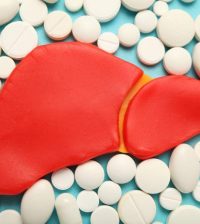- Gene Therapy Improves Vision in People With Inherited Blindness
- Parental Deaths to Guns, Drugs Harmed Nearly 100,000 U.S. Kids in 2020
- Money Worries Top Seniors’ List of Health-Related Concerns: Poll
- Scientists Developing Vaccine Against Present and Future COVID Viruses
- ERs Often Missing Epilepsy in Kids With ‘Non-Motor’ Seizures
- Parents of Infants With Cystic Fibrosis Often Feel Confused, Unsupported: Survey
- Avoid Some ‘Project Watson’ Dog Eye Wipes Due to Infection Danger
- New Test Might Alert Pregnant Women to Preeclampsia Danger
- Combo Therapy May Be Advance Against Liver Cancer
- How ‘Unruly’ Sports Parents Harm Their Kids’ Mental Health
Several Medications Can Help People Quit Drinking: Study


A new review finds that several drugs can help curb the desire to drink alcohol, but the researchers note that these medications are rarely prescribed.
Acamprosate (Campral) and naltrexone (Revia), along with support from groups such as Alcoholics Anonymous or psychological counseling, can be useful tools to help people stay away from alcohol, the review authors report.
“Most people with alcohol use disorders aren’t getting any treatment, and only about 10 percent are getting a medication as part of their treatment,” said lead researcher Dr. Daniel Jonas, an assistant professor of medicine at the University of North Carolina at Chapel Hill.
Two other drugs, nalmefene (Selincro) and topiramate (Topamax) also can help patients stop drinking, he said. Nalmefene is approved for pain relief and topiramate is approved to prevent seizures, but they are also used “off-label” to treat alcohol abuse.
Part of the reason these medications aren’t used that much is that doctors aren’t sure there are drugs that work, Jonas said. “But we do have treatments that work, and we should be using them more than we are,” he added.
Jonas noted that these drugs should be used along with other treatments.
“We don’t know if they should be used alone. They are always studied in conjunction with a psychological intervention, whether it’s AA or cognitive behavioral therapy. The standard of care is that everyone should do one of those things and then you would add medication,” he said. “When you add medication, you get added benefit.”
The report was published May 14 in the Journal of the American Medical Association. The U.S. Agency for Healthcare Research and Quality funded the research.
Dr. Katharine Bradley, a senior investigator at the Group Health Research Institute in Seattle and co-author of an accompanying journal editorial, said several effective medications are available to treat alcohol use disorders.
However, these medications are often not offered to patients seeking treatment for these disorders, she said.
Unlike the older medications for alcohol abuse, these newer drugs don’t make people ill if they drink, Bradley explained.
“Instead, newer effective medications for alcohol use disorders address the underlying biology of addiction to alcohol, and make people less likely to drink or less likely to drink heavily if they do drink,” she said.
Patients fighting alcoholism should expect, or ask, for information about medications that could help them in their battle, Bradley said.
“The decision of which alcohol treatment to choose should be the result of discussions between patients and their clinicians that take into account patient values, preferences and goals,” she said.
For the new review, Jonas’ team reviewed 122 studies that evaluated acamprosate, naltrexone or both. The researchers then calculated the number of people who would have to be treated with a drug to see the benefit in a single patient.
The researchers found that 12 patients would have to be given acamprosate to see a benefit from the drug in one patient. For naltrexone, it would be 20 patients.
There haven’t been any head-to-head trials to see if one drug is more effective than the other, Jonas said.
For naltrexone, the researchers didn’t find an association with return to some drinking or heavy drinking, but they did find an association with reduction in the number of heavy drinking days.
Alcoholism can cause damage to the liver, brain and other organs and may increase the odds of dying early threefold, the researchers said.
More information
Visit the U.S. National Library of Medicine for more on alcoholism.
Source: HealthDay
Copyright © 2024 HealthDay. All rights reserved.










